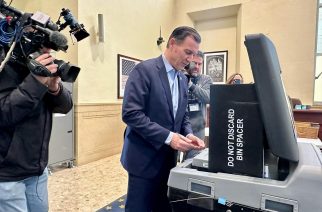
New York City Mayor Bill de Blasio visited Albany for a local government budget hearing where he addressed his issues with Gov. Andrew Cuomo’s proposed 2016-17 budget.
De Blasio was not entirely dissatisfied with the budget, saying the “good news is very good.” He lauded Cuomo for his push to raise the state minimum wage to $15 an hour and provide state family leave for New York workers. De Blasio also praised Cuomo’s commitment to the “Raise the Age” campaign, that would raise the age of criminal responsibility in New York — one of only two states that prosecutes 16- and 17-year-olds as adults.
But De Blasio’s tone changed when discussing the budget’s proposed cuts to New York City, including $485 million in proposed cuts to CUNY and a plan for New York City to take on approximately $209 million in state Medicaid payments next fiscal year. He also revealed his concern over a proposal to take $600 million in sales-tax revenue from New York City.
“These cuts are particularly onerous because New York City is the only municipality in New York state that does not receive direct municipal aid,” de Blasio said.
De Blasio’s concerns did not end there. He also asked the state to send its promised $100 million in capital funding for city public housing this year — which he says has not been delivered — as well as another $100 million each year over the next two years.
Senator Catharine Young, R-Olean, chairwoman of the Finance Committee was quick to respond to de Blasio on fiscal issues, arguing that New York City had the resources to support itself and help other municipalities in New York. She saw no problem with New York City paying more for the CUNY system.
“Seventy-one percent of the students who go to CUNY are from the city, but the entire bill for the CUNY system is picked up by the taxpayers of New York state,” Young said. “That was a temporary arrangement and dates back to a time when New York City was in fiscal crisis and could not afford CUNY. Now the city has the resources to resume the support of CUNY.”
Young was also quick to point out that New York City has a surplus in its budget and could therefore afford to help support struggling municipalities across the state.
De Blasio defended his policy to keep a large surplus in New York City, arguing that it will be needed for an unexpected economic downturn. De Blasio often repeated “it’s not about ‘if’ but ‘when,’” implying that such an incident is inevitable. He said that in an economic downturn the state would not be able to support the city, as New York City already creates nearly 60 percent of the entire state’s revenue.
“In these scenarios there is no safety net for us, there is no ability to turn to you and say ‘hey help us out of a jam,’” de Blasio said. “We know you’re not in a position to do that, so we have to have reserves, we have to have fiscal responsibility.”
Some lawmakers also had problems with the fact that New York City is the only municipality without a property tax cap, something they said is unfair for taxpayers. Assemblyman Michael Cusick of Staten Island said property taxes are a major issue among his constituency.
De Blasio said a property tax cap would be harmful to New York City’s economic stability, but also pointed out that the city had not raised property taxes recently.









